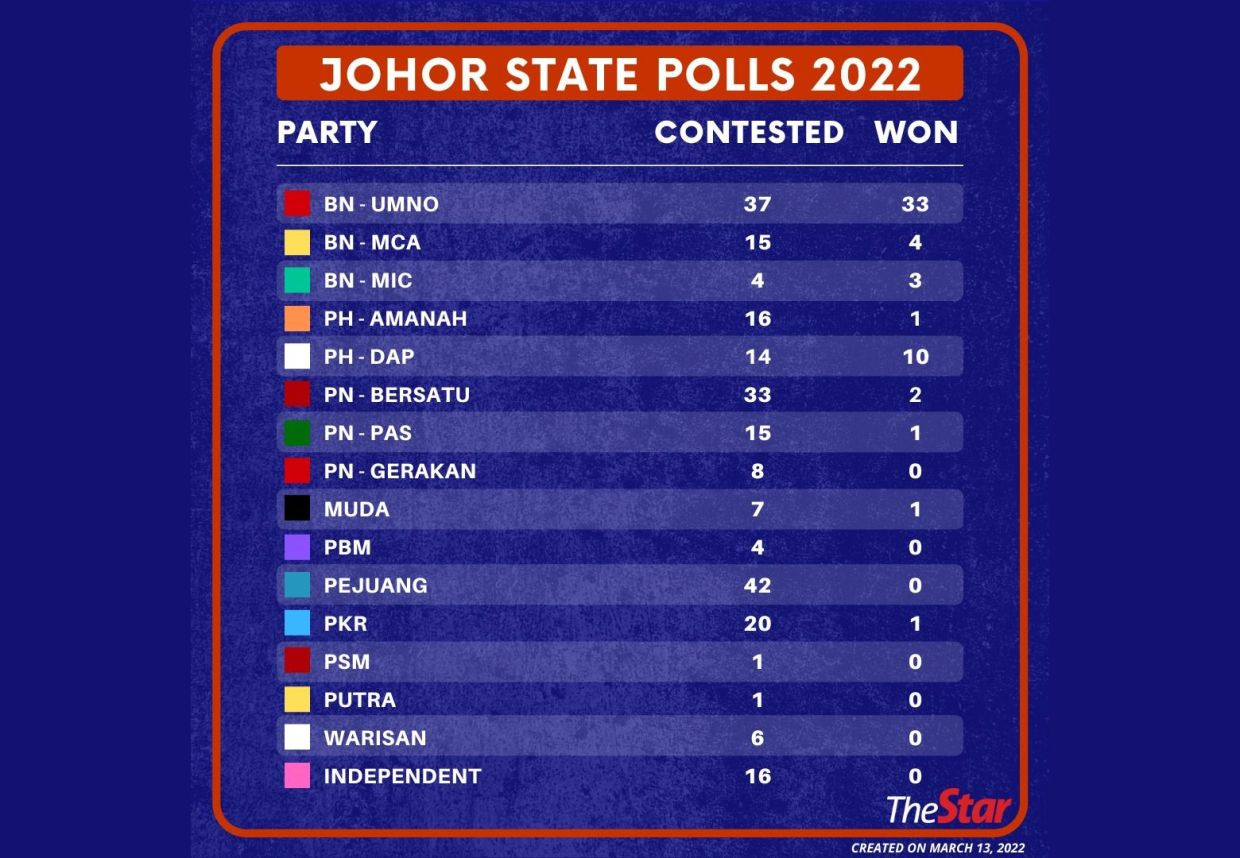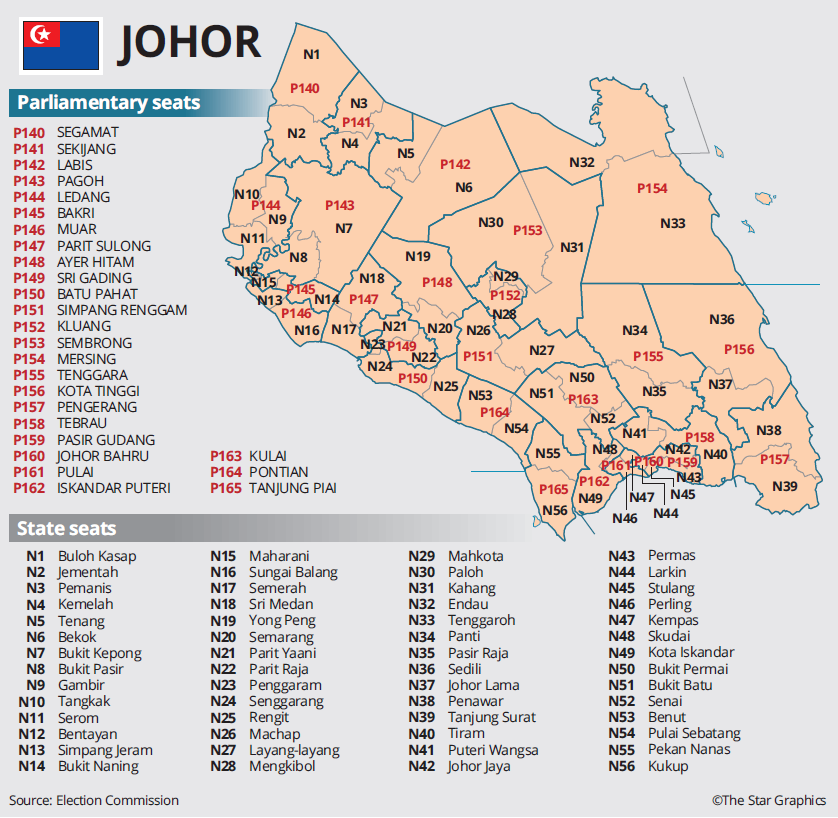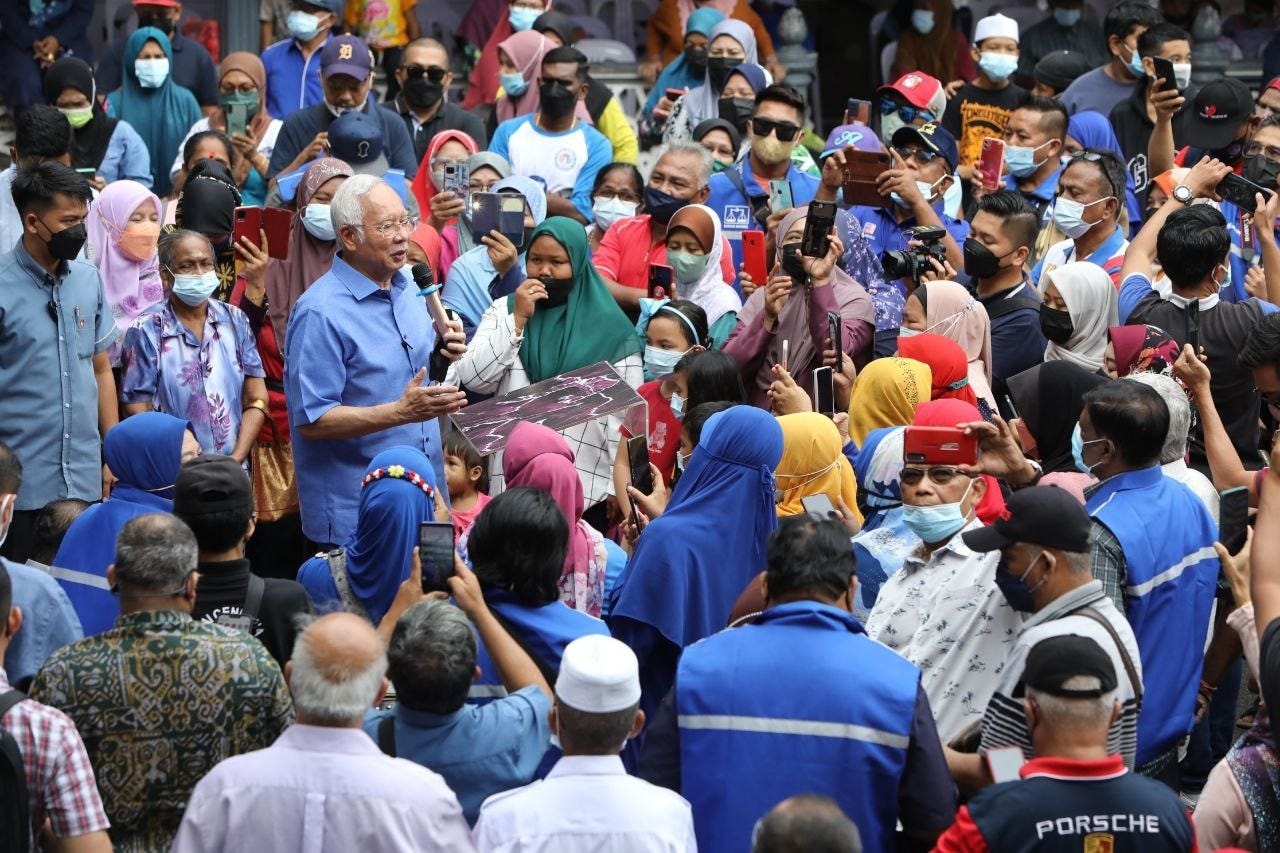Johor state election takes Malaysia back to the future
Opposition needs to rebuild from scratch
The Johor state election results came in as the majority of political analysts predicted. Now the realities of what just happened need to be digested. Many had long been talking about UMNO and the Barisan Nasional (BN) becoming the dominant political force once again. Now the nation has to live with this, and the many consequences arising from this result.
The BN gained a resounding victory, achieving a two-thirds majority in the Johor state assembly. The component parties of the BN won 40 seats (UMNO 33, MCA 4, MIC 3) of the 56 seat state assembly. The coalition received 43.11% of the popular vote, up from 40.4% in 2018.
Although Muhyiddin Yassin’s Perikatan Nasional coalition made up of Bersatu and PAS garnered 24.04% of the popular vote, the coalition was trounced by the BN, and could only muster 3 seats (Bersatu 2, Pas 1). This represents a loss of 9 seats from 2018 state election.
Pakatan Harapan (PH) which actually won the state government back in 2018, lost 15 seats, where they are now left with a residual 12 seats in the new assembly. The DAP now has only has 10 seats, a loss of 4. PKR has only 1 seat, a loss of 6 seats, and Amanah 1 seat, with a loss of 5 seats. Seven PKR candidates lost their deposits to the Electoral Commission (EC), while 4 Amanah candidates lost theirs.
Syed Saddiq’s Malaysian United Democratic Alliance (MUDA) in its first participation in an election gained one seat in Puteri Wangsa, out of the 7 they contested. All 43 Perjuang candidates lost their deposits with the EC, as did WARISAN and Parti Bangsa Malaysia (PSM) candidates.
Fifty-five percent voter turnout
The 55% voter turnout was one of the lowest in Malaysian electoral history. Only 1.39 million of the 2.6 million registered voters turned out. However, this was almost 100,000 more voters than the 2018 state election, held in conjunction with the federal election.
There are many factors come in into play here. A stand-alone state election is much more low key than a combined federal/state election. Many of the 1.2 million that failed to vote, didn’t leave Singapore or their places of work around the peninsula to come and vote. The 36% voter turnout in the DAP stronghold of Skudai indicates apathy and/or disappointment with political representatives.
The young voters, eligible to vote for the first time appeared somewhat apathetic or disenchanted with the political process to come out and vote. The fear of Covid still prevails around the country, especially with daily reported cases up around the 33,000 mark.
Pundits claim that a low voter turnout would greatly advantage BN, but this doesn’t really appear to have been the case. The popular PH vote went up from 255,990 in 2018 to 367,525 in this election.
The implications for Malay-centric parties
The Johor state election has settled the argument over which is the dominant Malay-centric party. UMNO has shown based on Johor and Melaka state elections, it may be able to win outright in the peninsula with its two coalition partners MCA and MIC. With support from GPS in Sarawak and UMNO Sabah, BN can once again become the ‘natural’ government in Malaysia without serious challenge.
However, UMNO didn’t win from a position of strength. Members of the federal coalition UMNO shares power with in Putra Jaya ran separately and were found wanting against UMNO. Various reasons have been given for BN’s electoral success in Johor. Some say it was Ismail Sabri’s ‘good’ job as prime minister, others say it was electioneering by Najib Razak, known as ‘Bossku’ to voters, where Najib as persona became an election issue himself.
The ’Bossku’ phenomena is a major dilemma for UMNO. Rather than celebrating a great electoral win, UMNO strategists are now bunkered up trying to determine their next moves. This election has psychologically weakened Ismail Sabri’s position. However, any coup against him would split parliamentary numbers, where any certain outcome is uncertain. Its most probably all efforts will be put into the UMNO party elections with winner take all. This is certainly going to distract the UMNO members of cabinet over the next few months.
Ahmad Zahid Hamidi, president of UMNO praised deputy president Mohamed Hasan as the deputy campaign chief. However, one thing for sure BN’s election strategists were able to out manoeuvre all the other candidates and parties in the election, and cannot be under-estimated in future elections.
Politically Muhyiddin Yassin is greatly weakened, being defeated in his own stronghold of Johor. This gives him much less influence federally from now on. Most Bersatu seats are in danger of being lost to UMNO next general election, and all know this. However, PN did mange 334,457 or 24% of the vote on a popular basis. Whether PN support can be refocused into winning constituencies next general election is a great challenge, particularly to Bersatu.
For PAS, its heartlands are along the East Coast and Kedah. PAS must refocus on holding what seats they have in their own heartlands, rather than try to expand their electoral influence nationally. If PAS doesn’t heed this warning, they could be weaker after the next election.
For Mahathir’s Perjuang, the wisest thing would be for Mahathir to retire at the end of this parliamentary term and not recontest his Langkawi seat. His son, Mukhriz Mahathir will have a tough fight in the adjoining seat of Jerlun to just hold it.
The opposition as a grouping will need to think radically to remain relevant
The MOU between PH and prime minister Ismail Sabri technically makes PH a pro-government party within the parliamentary system of governance. Talk of extending this until July next year, especially after a budget many believe the opposition should have rejected on principle, has created disappointment and apathy towards PH. DAPs loss of Yong Peng to the MCA should reinforce the reality of the damage done from the MOU.
Anwar’s insistence of putting himself above the greater cause of the alliance is now leading to accusations of Anwar being a BN ‘trojan horse’ and/or letting his ego get in front of real party interests. Within the PKR today, there are those who faithfully believe in Anwar Ibrahim and those who are developing a growing disillusionment with him. PKR has already ripped itself apart with the exit of the Azmin Ali group in 2020. The question here is whether PKR could survive another exodus.
The wisdom of accepting Maszlee Malik into PKR has to be questioned when he lost by 2815 votes to UMNO’s Abdul Mutalip Abdul Rahim. Maszlee’s poor performance in the education portfolio should not have been rewarded with candidacy under the PKR banner in an election. Based on the state election result in Layang Layang, which is within Maszlee’s federal seat of Simpang Renggam, he is most unlikely to hold onto the seat in the general election.
The DAP has to be disappointed and consider what the party must do to return to electoral relevancy. Anthony Loke has gone on record saying that the DAP will work with anyone to form a stable government. Pragmatism will be needed to rebuild a real opposition with DAP as the backbone and mentor.
DAP can nurture alliances with MUDA, Warisan, and elements of any other parties that may break away. Such an alliance, or even new party, would require a policy based platform rather than the ad hoc approach that PH has pursued to date. Any MOU with the government is negative to the electorate. Tony Pua’s staunch support for the MOU has backfired on his own integrity.
There are a lot of potential scenarios ahead. Some at this point of time might be fantasy. However, fantasy has a knack of becoming reality very quickly in politics. Who would have said after GE13 that Mahathir would lead a PH coalition to victory in GE14, ousting Najib Razak? Who would have said that Muhyiddin Yassin would have been home minister in a PH government?
So where does Bersatu have to go now? It can become subservient to UMNO or go alone and talk to a new coalition. If UMNO splits over the Ismail Sabri’s fall from power, there must be a new coalition to talk to. If PKR splits, there must be a new coalition those who leave can talk to. These are the options that may prevent Malaysia going back to the future. A radical realignment of parties and splinters of parties to create a new entity to challenge the old.
As the Zahid-Najib forces prepare to takeover UMNO and control of government, it will bring a reaction. While waiting for the unforeseeable, the DAP must align the possible today. Its time for the opposition to change trajectory or become irrelevant electorally. Opposition groups cannot wait for Anwar to lead PKR into the darkness once again. There must be a viable lifeboat for splinter groups to jump onto to create that incentive for them to jump.
Creative thinkers are desperately needed here.
Click on subscribe so articles can be directly emailed to your inbox:







What would your comment be if the real reason the opposition lost was because many who believed in PH once, many from BN, realised that BN was a better govt prior to 2018 than the 22 months of PH and the instability that comes after that